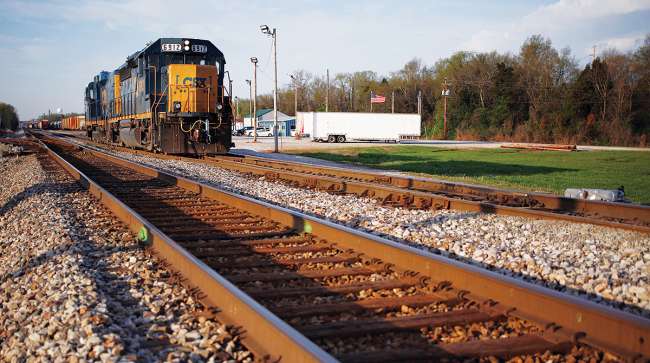Senior Reporter
CSX Reports Lower Q4 Earnings Amid COVID-19 Pandemic

[Stay on top of transportation news: Get TTNews in your inbox.]
CSX Corp. reported lower fourth-quarter and annual income and revenue compared with 2019, officials for the Class I railroad said Jan. 21.
The coronavirus pandemic is partly responsible for the decline even as the railroad’s freight volume increased slightly, officials said.
For the fourth quarter, the Jacksonville, Fla.-based company’s net income was down 1% to $760 million, or 99 cents per share, compared with $771 million (99 cents) the year before.
The results include a charge of $48 million, or 5 cents per share after tax, related to the early retirement of debt. Without that, CSX would have reported earnings per share of $1.04.
Revenue dropped 2% to $2.82 billion compared with $2.88 billion in 2019.
For the year, earnings slumped 17% to $2.76 billion ($3.16) compared with $3.31 billion ($4.17) in 2019.

Sustainable trucking is here. In this episode, we'll talk to two major players in the transportation technology sector that are helping fleets move closer to total supply chain sustainability. Hear a snippet, above, and get the full program by going to RoadSigns.TTNews.com.
Revenue dropped 11% to $10.58 billion from $11.93 billion in 2019.
The CSX quarterly operating ratio improved to 57 from 60, and for the year it slipped slightly to 58.8 from 58.4.
Operating ratio (expenses as a percentage of revenue) is used to measure efficiency. The lower the ratio, the higher the company’s ability to generate profit.
CEO Jim Foote is cautiously optimistic the U.S. economy and rail shipments will improve in this year, especially in the second half. However, he is still unsure how much growth there will be in the economy until there is more certainty about defeating the pandemic.
“It’s difficult to really draw a clear line of sight to the economy other than it seems to be continuing to improve,” Foote said. “All of this, I believe, is related to getting the virus under control. We’re optimistic, but really we have to take it day by day.”
CSX reported revenue was mixed for products it transports when measured against 2019.
- Coal revenue declined 18% year-over-year to $375 million from $459 million. “The coal business continues to be negatively impacted by lower domestic utility demand, industrial production and global benchmark prices,” Foote said.
- Automotive revenue fell 8% to $275 million from $299 million.
- Other cargo dipped by 6% to $110 million from $117 million.
- Minerals fell 5% to $133 million from $140 million.
- Forest products declined 1% to $207 million from $210 million.
- But the agriculture and food products sector increased 6% to $375 million from $354 million.
- Intermodal revenue was also up 6% to $476 million from $449 million.
- Metals and equipment increased 3% to $175 million from $170 million.
- Chemicals increased 1% to $586 million from $579 million.
“Over the course of the year, we reexamined every process from the ground up to identify and eliminate unnecessary steps across the railroad. And as a result, we uncovered significant opportunities to build upon the progress made during our transformation. These changes will provide benefits for years to come,” Foote said.

Foote
CSX is one of several Class I railroads that have aggressively moved to become more efficient by utilizing precision-scheduled railroading, which involves moving freight with fewer railcars and locomotives using a more simplified, direct line of transport across the network.
Fuel costs also dropped by $77 million as diesel’s price plunged amid the COVID-19 pandemic.
Want more news? Listen to today's daily briefing:
Subscribe: Apple Podcasts | Spotify | Amazon Alexa | Google Assistant | More




